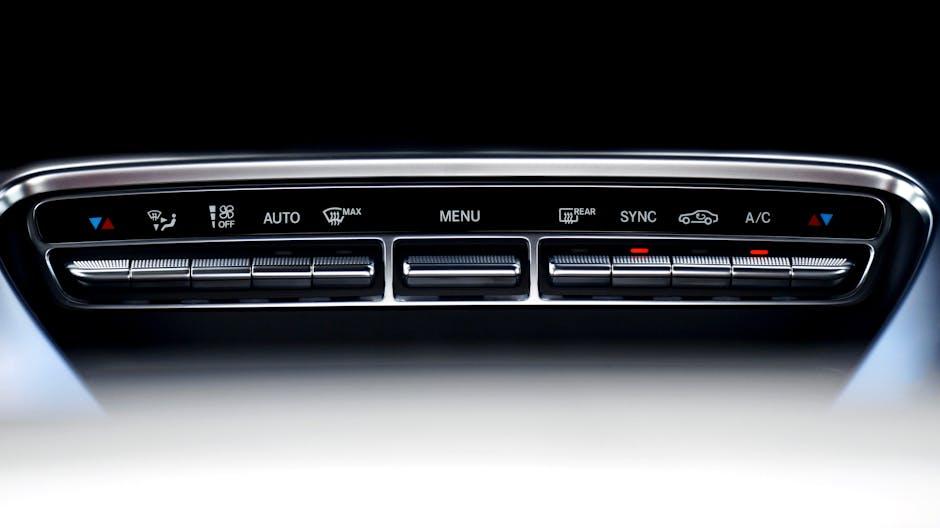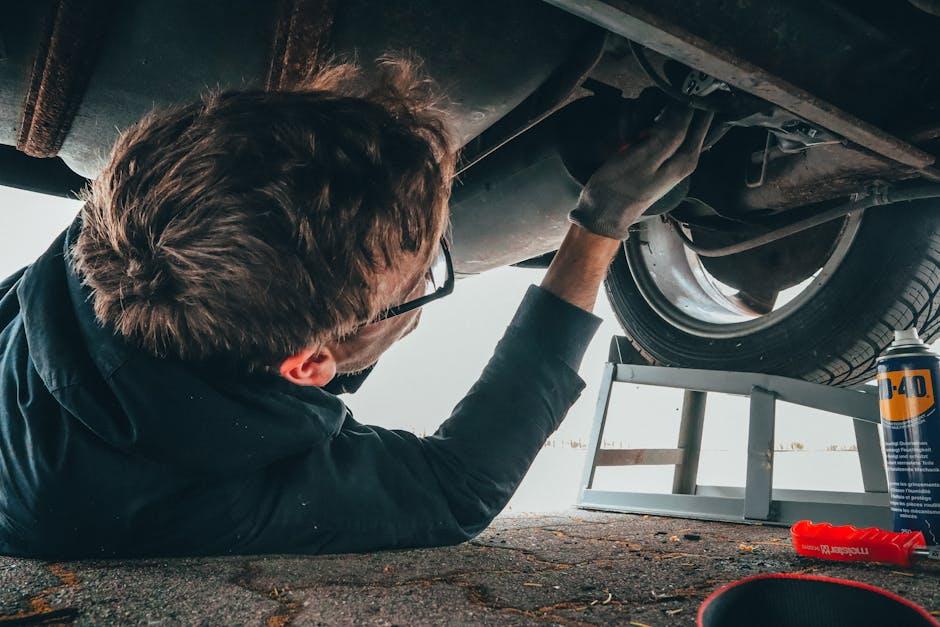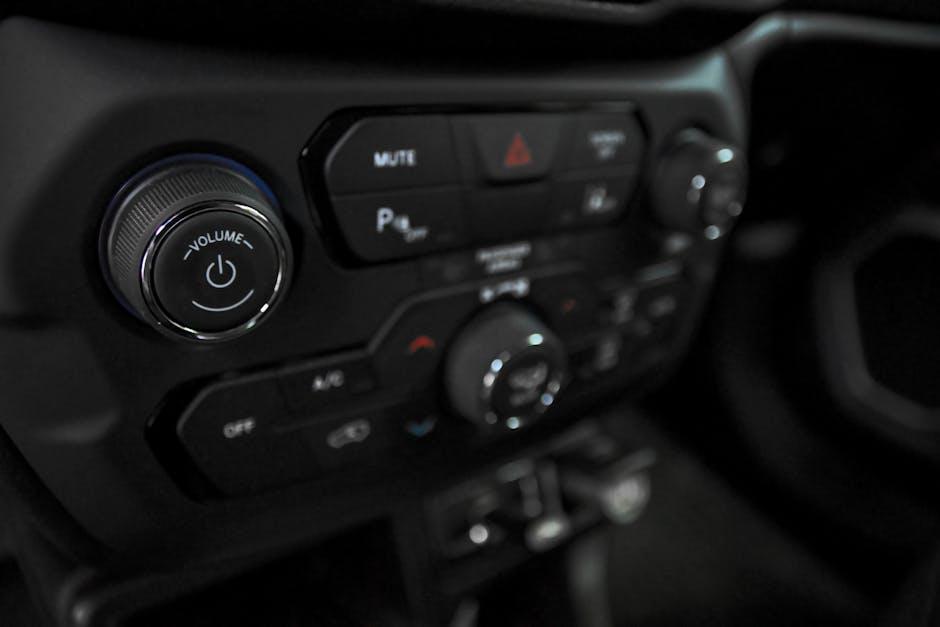There’s nothing quite as refreshing as stepping into a cool car on a hot day—until an unwelcome, foul odor hits you from the air vents. Bad smells wafting from your car’s air conditioning system can turn a pleasant drive into an uncomfortable experience. But before you reach for the air freshener, it helps to understand where these odors come from and how to effectively tackle them at the source. In this article, we’ll explore practical steps to identify, prevent, and eliminate unpleasant smells from your car’s AC, ensuring every journey feels fresh and inviting.
Table of Contents
- Understanding the Root Causes of Unpleasant Car AC Odors
- The Importance of Regular AC Maintenance for Fresh Air
- Effective Cleaning Techniques to Eliminate Mold and Mildew
- Using Specialized Products to Combat Car AC Smells
- Tips for Preventing Future Odors in Your Vehicle’s AC System
- When to Seek Professional Help for Persistent Bad Smells
- Q&A
- The Way Forward

Understanding the Root Causes of Unpleasant Car AC Odors
Unpleasant odors from a car’s air conditioning system often stem from the buildup of moisture and organic matter within the unit. When the AC is running, the evaporator coil cools the air, creating condensation that can accumulate in hidden spaces. This damp environment becomes a breeding ground for mold, mildew, and bacteria, which release musty, stagnant smells anytime the system circulates air. Additionally, debris such as leaves, dirt, and pollen trapped in the vents can rot, intensifying the foul odor that invades the cabin.
Other common contributors to bad smells include:
- Clogged cabin air filters that fail to trap pollutants, allowing contaminants to enter the system.
- Coolant leaks which may produce a sweet, chemical scent when fluids escape the AC unit.
- Pest infestations where insects or rodents inhabit AC components, leaving behind unpleasant odors.
| Cause | Typical Odor | Effect |
|---|---|---|
| Mold in Evaporator Coil | Musty / Damp | Causes respiratory irritation and discomfort |
| Clogged Air Filter | Stale / Dusty | Reduces air quality and airflow |
| Coolant Leak | Sweet / Chemical | Potential toxicity and system damage |
| Pests in Vents | Rotten / Decay | Harmful bacterial growth |

The Importance of Regular AC Maintenance for Fresh Air
Maintaining your car’s air conditioning system isn’t just about staying cool; it plays a crucial role in ensuring the air you breathe inside your vehicle is fresh and healthy. Over time, dust, moisture, and bacteria can accumulate in your AC vents and filters, creating the perfect environment for mold and mildew to thrive. These unwanted guests not only cause unpleasant odors but can also negatively impact your respiratory health. Routine inspections and cleaning prevent these problems before they escalate, guaranteeing a continuous flow of crisp, clean air with every drive.
Regular upkeep of your AC system should involve several key practices:
- Changing or cleaning the cabin air filter every 12,000 to 15,000 miles
- Flushing the air conditioning evaporator to remove trapped moisture
- Checking for refrigerant leaks that could reduce efficiency
- Using professional disinfectant sprays designed for automotive AC systems
| Maintenance Task | Frequency | Benefit |
|---|---|---|
| Filter Replacement | Every 12,000–15,000 miles | Improves air quality and airflow |
| Evaporator Cleaning | Annually | Prevents mold and odors |
| Leak Inspection | Every 2 years | Maintains AC efficiency |

Effective Cleaning Techniques to Eliminate Mold and Mildew
Combatting mold and mildew residues inside your car’s AC system requires more than just surface cleaning. Start by mixing a natural cleaning solution of white vinegar and water or use a commercial antifungal spray specially formulated for automotive use. Spray this mixture liberally onto accessible vents and the evaporator coil, ensuring you don’t oversaturate sensitive electrical components. Allow the solution to sit for at least 15 minutes to break down the fungal colonies effectively before wiping down with a microfiber cloth. Additionally, using a handheld steam cleaner can penetrate hidden spots, lifting stubborn mold spores from tight crevices without harsh chemicals.
For ongoing maintenance, consider incorporating these simple habits:
- Regularly replace your cabin air filter every 12,000 to 15,000 miles to filter out moisture and contaminants.
- Keep the interior dry by wiping up spills and removing damp items promptly.
- Run the fan for a few minutes before shutting off your vehicle to help evaporate residual moisture.
| Cleaning Step | Key Action | Frequency |
|---|---|---|
| Initial Mold Treatment | Vinegar spray application and steam cleaning | Once every 3 months |
| Filter Replacement | Replace cabin air filter | Every 12,000–15,000 miles |
| Vent Maintenance | Run fan after use to dry system | Every drive |

Using Specialized Products to Combat Car AC Smells
When unpleasant odors invade your car’s interior through the air conditioning system, specialized products can offer a quick and effective remedy. These products target the root causes of bad smells, often mold, mildew, or bacterial growth within the AC vents and evaporator. Options range from antibacterial sprays and foams to ozone generators and vent cleaners designed specifically for automotive use. By using these targeted solutions, you not only mask the odor temporarily but also eliminate the source, ensuring fresher air during every drive.
To maximize results, consider the following common products that can transform your AC experience:
- Foaming Air Conditioner Cleaners: These inflate inside the vents, scrubbing away residue and microbes.
- Ozone Generators: Neutralize odors on a molecular level, ideal for stubborn, lingering smells.
- Antibacterial Sprays: Quick and easy to apply, perfect for regular upkeep.
- Activated Carbon Filters: Replace old filters with these to absorb odors and pollutants.
| Product Type | Best For | Frequency of Use |
|---|---|---|
| Foaming Cleaner | Deep dirt & mold | Every 6 months |
| Ozone Generator | Persistent odors | As needed |
| Antibacterial Spray | General upkeep | Monthly |
| Carbon Filter | Air purification | Every 12 months |

Tips for Preventing Future Odors in Your Vehicle’s AC System
Maintaining a fresh-smelling vehicle AC system requires consistent care and attention. Start by regularly replacing your cabin air filter, as a clogged or dirty filter traps moisture and airborne particles that contribute to foul odors. Additionally, avoid leaving food or drink containers inside the car overnight, which can promote bacterial growth within the vents. Including routine system inspections as part of your vehicle maintenance schedule helps identify and resolve minor issues before they escalate into persistent smells.
Another essential habit is to run your AC on the “fresh air” mode rather than recirculate air all the time. This promotes better airflow and prevents moisture buildup inside the unit. Here’s a quick guide to effective AC usage habits:
- Switch to fresh air mode for at least 10 minutes each trip.
- Turn off the AC ahead of parking to allow evaporator drying.
- Use antimicrobial sprays designed specifically for vehicle AC vents periodically.
| Action | Benefit |
|---|---|
| Filter Replacement | Prevents odor-causing debris buildup |
| Fresh Air Mode | Reduces moisture accumulation |
| Regular Cleaning | Keeps vents mold-free and fresh |

When to Seek Professional Help for Persistent Bad Smells
Sometimes, a persistent odor from your car’s AC system signals more than just ordinary mildew or dust buildup. When unpleasant smells linger despite your best efforts with regular cleaning and air fresheners, it’s a clear indication that professional intervention is needed. Issues like mold deep inside the evaporator, clogged drain tubes, or even refrigerant leaks can be challenging to identify without specialized tools and expertise.
Delaying professional help can not only worsen the smell, but might also affect your health and the longevity of your AC system. If you notice any of the following signs, it’s wise to book a consultation with an automotive HVAC specialist:
- Musty or moldy smells that persist after cleaning
- Unusual noises or reduced airflow coming from vents
- Visible moisture or water accumulation inside the cabin
- Allergic reactions like sneezing or headaches during AC use
Q&A
Q&A: How to Deal with Bad Smells from Your Car AC
Q1: What causes unpleasant odors to come from a car’s air conditioning system?
A1: Bad smells from a car AC often originate from mildew, mold, or bacteria buildup inside the air vents and evaporator. Moisture accumulated during use creates the perfect breeding ground for these microbes, leading to that musty or sour scent when you switch on the AC.
Q2: How can I quickly get rid of the bad smell when I first turn on the AC?
A2: A quick fix is to switch the AC to fresh air intake instead of recirculation and run it at a high fan speed with the windows down, allowing the moisture and odors to escape. Turning the heat on for a few minutes before activating the AC can also help dry out the evaporator and reduce the smell.
Q3: What are some effective cleaning methods for persistent AC odors?
A3: You can use specialized AC disinfectant sprays that target mold and bacteria inside the ducts. Another method is to replace or clean the cabin air filter, as a dirty filter can trap moisture and smells. For a deeper clean, consider having the evaporator professionally cleaned or treated with an ozone generator.
Q4: Can regular maintenance prevent bad smells in the car AC?
A4: Absolutely! Regularly replacing the cabin air filter, running the AC on fresh air mode, and allowing the system to dry out by running the fan without AC before switching off can greatly reduce odor buildup. Keeping the car interior clean and dry also helps prevent unpleasant smells.
Q5: Are there any DIY tips to naturally combat AC odors?
A5: Yes! Placing an open box of baking soda or activated charcoal in the car can absorb odors over time. Wiping down air vents with a mild vinegar solution or using essential oil diffusers with scents like eucalyptus can also provide a fresher smell, but these are more short-term solutions.
Q6: When should I see a professional about my smelly car AC?
A6: If odors persist despite your cleaning efforts, it might be time to visit a mechanic. Persistent smells could indicate mold deep in the system or leaks in the AC unit that require expert attention to clean, repair, or replace components.
By understanding the root causes and practicing good AC hygiene, your car’s air conditioning can keep blowing fresh and comfortable breezes on every drive.
The Way Forward
Dealing with unpleasant odors from your car’s AC may not be the most glamorous task, but it’s essential for a fresh and comfortable driving experience. By understanding the common causes and applying simple maintenance techniques, you can keep your car’s interior smelling clean and inviting. Remember, a little attention now goes a long way in preventing bad smells down the road—so breathe easy and enjoy every journey with confidence and clarity.

